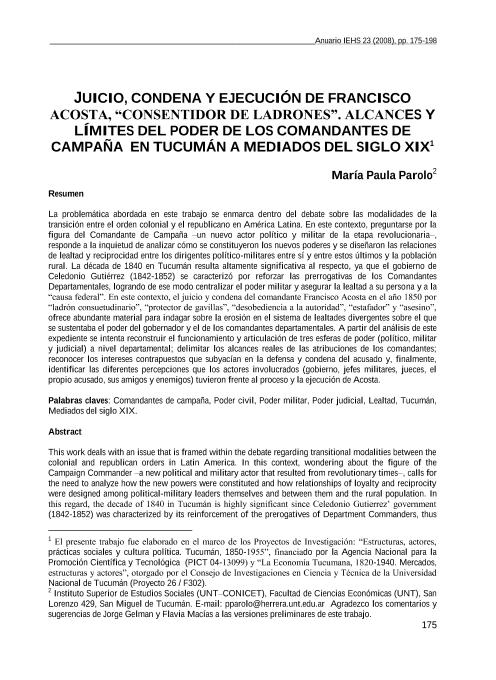Artículo
La problemática abordada en este trabajo se enmarca dentro del debate sobre las modalidades de la transición entre el orden colonial y el republicano en América Latina. En este contexto, preguntarse por la figura del Comandante de Campaña –un nuevo actor político y militar de la etapa revolucionaria–,responde a la inquietud de analizar cómo se constituyeron los nuevos poderes y se diseñaron las relaciones de lealtad y reciprocidad entre los dirigentes político-militares entre sí y entre estos últimos y la población rural. La década de 1840 en Tucumán resulta altamente significativa al respecto, ya que el gobierno de Celedonio Gutiérrez (1842-1852) se caracterizó por reforzar las prerrogativas de los Comandantes
Departamentales, logrando de ese modo centralizar el poder militar y asegurar la lealtad a su persona y a la “causa federal”. En este contexto, el juicio y condena del comandante Francisco Acosta en el año 1850 por “ladrón consuetudinario”, “protector de gavillas”, “desobediencia a la autoridad”, “estafador” y “asesino”,
ofrece abundante material para indagar sobre la erosión en el sistema de lealtades divergentes sobre el que se sustentaba el poder del gobernador y el de los comandantes departamentales. A partir del análisis de este expediente se intenta reconstruir el funcionamiento y articulación de tres esferas de poder (político, militar y judicial) a nivel departamental; delimitar los alcances reales de las atribuciones de los comandantes; reconocer los intereses contrapuestos que subyacían en la defensa y condena del acusado y, finalmente, identificar las diferentes percepciones que los actores involucrados (gobierno, jefes militares, jueces, el propio acusado, sus amigos y enemigos) tuvieron frente al proceso y la ejecución de Acosta. This work deals with an issue that is framed within the debate regarding transitional modalities between the colonial and republican orders in Latin America. In this context, wondering about the figure of the Campaign Commander –a new political and military actor that resulted from revolutionary times–, calls for the need to analyze how the new powers were constituted and how relationships of loyalty and reciprocity were designed among political-military leaders themselves and between them and the rural population. In this regard, the decade of 1840 in Tucumán is highly significant since Celedonio Gutierrez‟ government (1842-1852) was characterized by its reinforcement of the prerogatives of Department Commanders, thus achieving the centralization of military power, ensuring their loyalty to him and to the “federal cause”. In this context, the trial and sentence of Commander Francisco Acosta in 1850, accused of “being a consuetudinary thief”, a “protector of rascals”, “disobeying of authority”, “being a swindler and a murderer”, offers plenty material to dig deeper into the erosion of the system of diverging loyalties on which the governor‟s and the department commander‟s power was upheld. The reason behind the analysis of this record is to reconstruct the functioning and articulation of the three areas of power (political, military and legal) at a departmental level; to identify the real limits of the commanders‟ attributions; to recognize counter interests that underlay in the defense and sentence of the accused and, finally, to identify the different perceptions that the actors involved (government, military chiefs, judges, the accused, his friends and enemies) had in the face of Acosta‟s trial process and execution.
Juicio, condena y ejecución de Francisco Acosta "consentidor de ladrones". Alcances y límites del poder de los comandantes de campaña en Tucumán a mediados del siglo XIX
Título:
Judgment, condemn and execution of Francisco Acosta "protector of rascals”. Prospect and limit of the military power, legal power in the cause of Tucumán, mid-19th century.
Fecha de publicación:
06/2008
Editorial:
Universidad Nacional del Centro de la Provincia de Buenos Aires. Facultad de Ciencias Humanas. Instituto de Estudios Histórico-Sociales «Prof. Juan Carlos Grosso»
Revista:
Anuario IEHS
ISSN:
0326-9671
Idioma:
Español
Tipo de recurso:
Artículo publicado
Clasificación temática:
Resumen
Archivos asociados
Licencia
Identificadores
Colecciones
Articulos(ISES)
Articulos de INST.SUPERIOR DE ESTUDIOS SOCIALES
Articulos de INST.SUPERIOR DE ESTUDIOS SOCIALES
Citación
Parolo, María Paula; Juicio, condena y ejecución de Francisco Acosta "consentidor de ladrones". Alcances y límites del poder de los comandantes de campaña en Tucumán a mediados del siglo XIX; Universidad Nacional del Centro de la Provincia de Buenos Aires. Facultad de Ciencias Humanas. Instituto de Estudios Histórico-Sociales «Prof. Juan Carlos Grosso»; Anuario IEHS; 23; 6-2008; 175-198
Compartir




